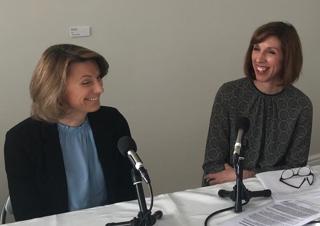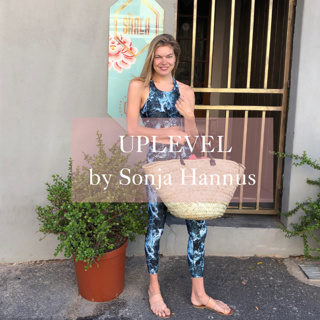
164 - When ADHD collides with perimenopause with Margaret Reed Roberts
Margaret Reed Roberts is an experienced social worker and educator who noticed a change in how she felt in her late 40s. Along with more obvious symptoms of perimenopause, such as hot flushes and migraines, there came a deterioration in her cognition – she struggled to initiate, plan and complete daily tasks and the mental load became unmanageable. A friend suggested there may be more than perimenopause going on and questioned if Margaret was neurodivergent. In this honest and insightful conversation, Margaret shares of the ‘relief and grief’ of being diagnosed with ADHD as an adult and the impact she now understands ADHD has on her daily activity, home life and relationships. Margaret’s three tips for those who have ADHD or think they might have it: (provided after the conversation) Be informed. Knowledge is a game changer. You feel more confident when you understand and are better able to advocate for yourself. Challenge others where necessary, using your acquired knowledge and pass that information on. Don’t be alone; join support groups, talk to empathetic friends and family. Tell your story. You and your story are valuable, not everyone will listen or care, but the more we talk, the more we break taboos and stigma. Follow Margaret on Facebook Twitter: @geordiereed
9 Elo 202228min

163 - When night sweats are not the menopause with Dr Susanna Crowe
Susie Crowe is a consultant obstetrician and gynaecologist who is passionate about advocating for and empowering women to understand their bodies and supporting them to make choices about their medical care and their lifestyle. In the midst of the pandemic, Susie noticed fatigue creeping in and put it down to burnout from her busy job. When she began having night sweats and saw her doctor, the menopause was the initial diagnosis suspected but there were no other symptoms of perimenopause occurring. Susie became more unwell and after months of having normal blood tests, further investigations revealed that she had non-Hodgkin lymphoma – a type of blood cancer. In this episode, the experts discuss women’s experiences of sudden onset menopause after treatments for cancer and the benefits and safety of HRT. Susie’s advice to healthcare professionals: Listen to your patients as they know their bodies best Have empathy for a women’s menopausal symptoms (as they may be worse than those from the cancer or side effects from treatments) and she may feel very vulnerable Prioritise personalisation and choice by providing the right information and encouraging your patient to make their own decision based on what’s important to them and their life. Follow Susie on social media: Twitter @susannacrowe Instagram @theholisticobgyn
2 Elo 202231min

162 - Divorce, perimenopause and menopause with Farhana Shahzady
Farhana is an accredited family law specialist and mediator working with Family Law Partners in London. During her 20-year career, Farhana often noticed an unspoken element at play when helping women through divorce, but it wasn’t until she identified perimenopause within her peer group and those close to her that she appreciated the extent of the problem and was able to professionally decipher the impact of menopause on relationship breakdown. Farhana launched the Family Law Menopause Project to see whether any other colleagues in family law were factoring in this important element and to raise awareness of perimenopause and menopause when it comes to family cases dealing with divorce, splitting the assets, children issues or domestic abuse. Farhana’s tips for family lawyers: Listen, enquire, and communicate. Look for cues and don’t be afraid to ask questions If you think a client is experiencing peri/menopausal symptoms affecting their relationships and wellbeing, invite them to see their doctor Factor the menopause into your cases. Pick a family process that suits the client, for example arbitration or mediation, and be sympathetic. Visit Farhana’s family law practice at www.familylawpartners.co.uk Follow Farhana on Twitter at @ShahzadyLaw @LawMenopause or lawmenopause on Instagram
26 Heinä 202231min

161 - Jill’s experience of heart attacks and hormones
Until a few years ago, Jill was in denial about her age, the menopause and what that meant for her future health. She had worked for 30 years as a fitness instructor and sports massage therapist; she was incredibly fit and had never given her heart health a moment’s thought. This abruptly changed in 2021 when Jill had sudden and severe pains in her chest and after some doubt and misdiagnoses by the medical team in A and E, she was found to have had at least one significant heart attack, possibly more. Since then, Jill has had ongoing intermittent chest pain, especially when having hot flushes, and she realised her continued cardiac symptoms were potentially linked to her changing hormones. Dr Louise Newson explains the link with estrogen deficiency and cardiac symptoms, and the increased risk of heart attacks after menopause. Together they discuss gender bias in heart research, the difficulties diagnosing heart attacks in women, the possible reasons for poorer outcomes compared to men and the cardiovascular benefits of HRT. Jill’s 3 tips to women if worried about your heart: Listen to your body, you know it best Do your own research, such as balance-menopause.com, Blood Pressure UK, British Heart Foundation websites Have someone with you at appointments, or over the phone if not in person If you know there’s something wrong with your heart, ask for a troponin blood test You can read Jill’s story here
19 Heinä 202230min

160 - Thinking hormones in psychiatric consultations with Dr Devika Patel
Dr Devika Patel joins Dr Louise Newson in this episode of the podcast to share how a chance encounter when overhearing an educational webinar on the menopause was a light bulb moment for her practice as a psychiatrist. Devika takes us through her journey of how this knowledge from learning about menopause has transformed the psychiatric care she now offers to her patients. Devika’s 3 tips for those with mental health challenges who are in perimenopause/menopause: Don’t forget the important lifestyle changes (healthy diet, exercise, reduce stress, improve sleep and have meaningful connections with others) apply to mental health just as they do with menopause. When seeking help, go with your own data to your healthcare appointment. Track your moods with your cycle and really make any links clear to your clinician. If you don’t feel your healthcare professional is the right match for you, see someone else and advocate for yourself. Website/socials details – Instagram @drdevikapatel Twitter @drdevikapatel Podcast: “Our Extraordinary Stories with Dr Devika Patel”
12 Heinä 202230min

159 - Raising awareness of HRT in the community in Ireland with Pharmacist, Victoria Jones
Victoria Jones is a community pharmacist at Bonnybrook Pharmacy in Coolock, Dublin. She received very little education on the menopause when training and became more interested in hormone health after her sister experienced severe symptoms at 40 and began taking HRT. The dramatic return of her sister’s health and wellbeing prompted Victoria to move away from running a chain of pharmacies to set up her own independent pharmacy with a focus on women’s health. When Victoria experienced her own perimenopause and she saw the profound benefits of HRT for herself, her passion escalated and Victoria now takes a very active role in raising awareness in her community with the public and local healthcare professionals, and in educating others through her social media. Victoria’s advice to women: Ask your pharmacist if they’ve done any training on the menopause and if not, mention the resources available such as on balance website and the Confidence in the Menopause course on fourteenfish.com. Find the right pharmacist for you. Don’t be fobbed off by healthcare professionals, if you aren’t listened to the first time, go in more empowered with information the next time. Ask for a specific clinical reason why they will not prescribe HRT, and ask them to write it down for you. Your pharmacist can explain how and when to take your HRT medication if your doctor wasn’t sure, or you didn’t have time to discuss thing fully. Your pharmacist can also help with information on improving health through lifestyle measures such as nutrition and exercise. Victoria’s pharmacy website is www.BonnybrookPharmacy.ie Follow Victoria on Instagram and Facebook @The_menopause_pharmacist
5 Heinä 202231min

158 - Pushing against social and political constraints on women’s health with Dr Heather Hirsch
Dr Heather Hirsch makes a welcomed return to the podcast this week. Heather is an internal medicine physician, specialising in women’s health and menopause care at the Brigham and Women’s Hospital in Boston Massachusetts, USA. Her clinical work and research centres on inequalities or unanswered questions in the field of women’s health, specifically in menopause education. In this episode the menopause experts discuss the bigger picture of menopause care as a gender issue, women’s role in society and in the workplace, perceptions of women’s suffering and the menopause as a medical specialty. Louise and Heather share the challenges they each continue to face to educate and inform the public and healthcare professionals on the perimenopause and menopause and the benefits and safety of HRT. Heather’s 3 tips: Know what’s going on in your body by keeping a journal and tracking your symptoms. I recommend the free balance app to my patients for this. List your own priorities and what matters most to you, whether that is your sexual health, your hair or skin, your sleep and so on. Understand the three strands of menopause management: lifestyle changes, non-hormonal treatments and HRT, and know the pros and cons for all to realise what choices are best for you. Follow Heather at: Instagram @hormone.health.doc Website: heatherhirschmd.com YouTube: Health by Heather Hirsch Podcast: Women’s Health by Heather Hirsch
28 Kesä 202233min

157 - Science based weight reduction that lasts with Dr Saira Hameed
Dr Saira Hameed is a consultant endocrinologist working at the Imperial Weight Centre and at Imperial College London. Her work focusses on researching the drivers for appetite, obesity, and regulation of body weight to develop science-based interventions that help people manage their weight and lead healthier lives. In this episode the experts discuss the impact of obesity on individuals’ health, on the NHS and wider society, and the science behind sugar, fats, and processed foods. Dr Hameed’s book, ‘The Full Diet’, explains the weight loss programme that is used in the NHS by clinicians and patients and was developed and trialled at Imperial College. Saira’s 3 tips: Short term – do everything you can to remove ultra-processed foods from your environment Medium term – look at all the factors that contribute to your weight such as your stress levels, sleep, activity levels and seek to address those too Longer term – be your own biggest fan. Feeling good about yourself will have a positive ripple effect on other areas of your life. ‘The Full Diet’ book is available now and published by Michael Joseph. Find her on her social channels on Instagram https://www.instagram.com/drsairahameed/ and Facebook https://www.facebook.com/thefulldietbook
21 Kesä 202233min






















